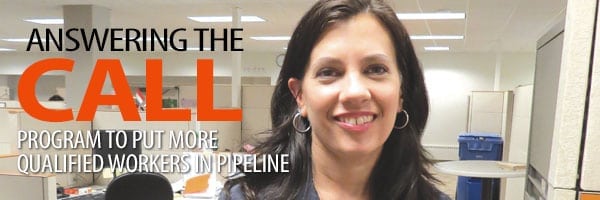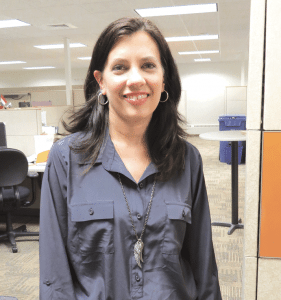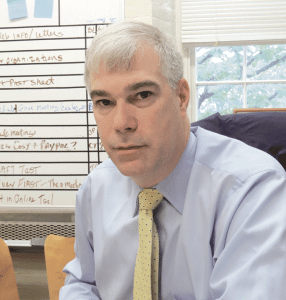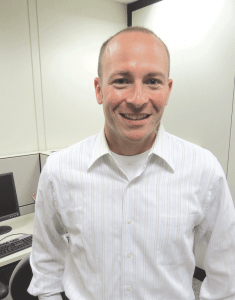
Answering the Call
Program Strives to Put More Qualified Workers in the Pipeline

Sarah Burek, one of the first graduates of the Advanced Call Center and Customer Service Training Program, is now an employee at MassMutual.
She had been out of work for seven months and was having no luck at all finding something in what would be considered her field — clerical work such as her most recent assignment handling payroll at Brodeur-Campbell Fence Co. until she was laid off.
“It was just not a good job market, and there were a lot of people vying for the same positions,” she told BusinessWest, adding that she eventually came to the conclusion that she had to move in a new direction.
And it was right about that time that her counselor at the Springfield-based one-stop career center FutureWorks told her about something called the Advanced Call Center & Customer Service Training Program, an initiative led by the Regional Employment Board of Hampden County (REB) in conjunction with the Training & Workforce Options (TWO) program created by Springfield Technical Community College and Holyoke Community College, and a host of other partners.
Burek was intrigued by what she heard, applied to be part of the first class of a pilot program, which was to start last August, and survived a rigorous vetting process that yielded 18 participants.
Fast-forward nine months or so, and Burek is gainfully employed at the Retirement Services call center at MassMutual’s Enfield facility, just a few weeks after passing the difficult Series 6 security exam required for such a position.
She said she enjoys the work handling calls involving everything from explaining investment options to altering contribution amounts for 401(k)s, and is already excited about where this door that opened for her may eventually lead.
“It’s been an exciting journey,” she noted, “and I can’t wait to see where this path takes me.”
This is exactly the script, not to mention commentary, that organizers of this program had in mind when they conceived it in late 2012 and then won a $350,000 grant from the state Executive Office of Labor and Workforce Development to get it off the ground, said Larry Martin, director of Business Services and special project manager for the REB, who spearheaded the initiative.
He said need was identified in two areas. First, people like Burek, unemployed and underemployed, needed new job opportunities and environments in which they could advance over time. Also, companies like MassMutual, Liberty Mutual, Thing5, and the area’s banks, among many other employers, needed a larger, better-equipped pool of candidates for jobs in customer service and call centers.
The new program essentially addresses both, said Bob LePage, executive director of the TWO program. He told BusinessWest that surveys of area companies with call centers and customer-service personnel revealed that they were getting a large quantity of applicants, but not sufficient quality.
“Our surveys revealed a number of common challenges,” he explained. “There was high turnover and problems recruiting bilingual candidates, but there were also difficulties in recruitment of individuals that could come in the door and quickly move up in the organization on that career path.”
Looking ahead, the third class in the pilot program will begin its summer session in July and graduate in October, said LePage, noting that what will follow is an evaluation of the initiative — organizers are already identifying needed tweaks, such as altering session graduation dates to meet industry needs — and a likely scaling up of the endeavor.
Ultimately, organizers believe, the call-center training program will help companies fill positions more efficiently and thus less expensively, reduce the high turnover rates in this profession, and perhaps make the region a more attractive landing place for those looking to open or expand call-center operations.
Indeed, while the program’s initial thrust was to assist companies struggling to staff call centers and customer-service departments, organizers eventually broadened the mission to include an economic-development component.
“If we really did have a program that showed the ability to scale to meet employer needs, then attracting other call centers to the region might be much more viable,” said LePage. “If we could position ourselves as having an asset of multi-language speakers in our workforce, and people with proper customer-service skills and language skills, we could have a regional competitive advantage, if not a New England or Northeast competitive advantage.”
All that comprises a fairly tall order, but stories like the one scripted by Burek and others like her show that this initiative has great potential to improve the hiring landscape — for job seekers and area employers alike.
Ringing True
LePage told BusinessWest that the phrase ‘call center’ usually conjures up images of vast, open rooms with rows of cubicles operated by financial-services giants and cable operators. And while the region does have several of these larger operations, there are call centers of all sizes across virtually every business sector in Western Mass.
All banks have them, he noted, as do healthcare providers and insurance companies such as Health New England. Meanwhile, manufacturers such as Smith & Wesson and Dinn Brothers, a trophy maker based in Holyoke, maintain large call centers as well.

Bob LePage says surveys of area employers revealed that they were getting applicants for call-center jobs, but not enough qualified applicants.
“What employers told us is, ‘we get applicants; we don’t get qualified applicants,’” said LePage. “They also say the number of applicants that they have to review to find a qualified applicant is a large funnel. While a company may be looking to bring in a class of 10 people, it may have to look through 200 to 300 applications to find 10 qualified at the level and abilities they want.”
Surveys of these companies revealed both general and specific needs, said Martin, adding that many employers struggle to find bilingual candidates — a considerable problem given the changing demographics in the region — while others have difficulty securing those with adequate people skills.
Training such individuals is a comprehensive — and expensive — undertaking, he went on, adding that this situation is exacerbated by annual turnover rates that reach or exceed 30% in some sectors.
Meanwhile, at MassMutual, there is another challenge, said Eric Blackman, a senior recruiter for the company, noting that individuals must be licensed to work at one of the company’s four call centers by the Financial Industry Regulatory Authority. And to get a license, candidates must pass that aforementioned Series 6 or Series 7 exam, which poses a number of difficult questions about finance and investments. If they don’t pass, they’re terminated.
“We end up losing a lot of individuals based on that,” he said, adding that the call-center training program has the potential to provide the company with candidates better-prepared to pass that test.
All of these factors prompted area workforce-development officials to come together and consider possible solutions, said Martin, adding that it was the financial-services sector, and especially MassMutual, that generated a dialogue on creating an action plan.
It came in the form of something called the Financial and Business Services Workforce Development Collaborative, which was created in the summer of 2012. It first involved a number of area banks and other financial-services businesses, but other companies, ranging from Thing5 to the staffing firm United Personnel, came on board as well.
“Upfront and center was the immediate need for customer-service and call-center personnel,” Martin explained. “But we wanted to look at the overall occupational needs of the industry long-term.”
The desire to meet those needs, while also creating new and better opportunities for the unemployed and underemployed, dovetailed nicely with the parameters of a request for proposals issued in 2012 by the Workforce Competitive Trust Fund, an agency dedicated to making Bay State businesses more competitive.
That RFP focused on sector initiatives to create candidates for hard-to-fill positions where additional training is needed, but also put an emphasis on what Martin called the “middle skills,” meaning opportunities for those with at least a GED but not a college degree.
The proposed Advanced Call Center & Customer Service Training program became the thrust of a response to that RFP, which involved the REB and TWO, as well as additional partners, including the Economic Development Council of Western Mass., DevelopSpringfield, Putnam Vocational High School, and others.

Eric Blackman says the call-center program may help MassMutual address the problem of recruiting a sufficient number of qualified bilingual candidates.
He described the 16-week program as “intense,” and by design, to meet the specific needs of employers, especially those in the financial-services sector.
“We didn’t want to set up anyone to fail,” he explained, adding that the vetting process is quite extensive and designed to weed out those who would not eventually meet the criteria for employment. “We do two levels of interviews to make sure that we’re matching the right individuals with this program.”
Busy Signals
Karen Zanetti was among those who went through, and passed, that rigorous interview process. She was one of the 18 members of the program’s second class who graduated on May 20.
Like Burek, she was unemployed — she was laid off from a job in human services roughly a year ago — and looking for a fresh start when she heard about the call-center initiative from her counselor at Holyoke-based CareerPoint and considered it an intriguing proposition.
“I had always had an interest in finance, banking, and customer service from years ago when I worked in retail,” she explained. “And when I saw the different kinds of classes that went into this program, it really appealed to me.”
She started an internship at MassMutual recently and hopes that experience will lead to a job with the company. Meanwhile, several members of her class have been hired by Liberty Mutual, and a few others have joined customer-service staffs at area banks and healthcare providers.
“It was a really good class,” said Martin, adding that the early results show that the program has real potential to reduce the size of the funnel LePage described and make it easier, and less expensive, for companies to secure qualified workers.
LePage agreed, adding that the success of the first two classes reveals that the program will likely benefit sectors other than financial services.
“One of the areas where we’ve had some dialogue and seen some success is the healthcare industry,” he noted. “We didn’t go into this thinking about this sector relative to call centers, but Baystate Health and Health New England both have significant call-center programs and need people with solid customer-service skills.”
The first two sessions of the pilot program have yielded some important lessons that will enable program organizers to make adjustments to better serve both participants and area employers, he added.
One such lesson concerns the scheduling of the sessions. Employers like MassMutual tend to hire at certain times of the year, and graduates need to be hitting the job market at those times, LePage said. “Our dialogue with industry partners revealed their desire to have the output of the students more aligned with their hiring patterns. Instead of a class that completes its work in December, they really see a value in completing in October, when they do their last hiring of the year. An officer with one of the banks said, ‘if you make toys, you don’t deliver on Christmas morning,’ and he’s right.”
Meanwhile, the first session revealed the importance of teaching the students the hiring process, he went on.
“We now run essentially a week of career experience,” he said. “The students do tours of area employers, such as Liberty Mutual. They spend a half-day there with the Liberty Mutual team, they sit in on calls, they visit the call center, they learn the operation.”
Program organizers also bring in eight to 10 employers for what LePage called “speed mentoring,” which amounts to one-on-one interviews that provide invaluable practice for the real thing.
It was during one of these speed-mentoring sessions that Blackman met Burek and immediately recognized that she was the type of candidate the company looks for.
“She was very articulate and very ambitious; she had the demeanor about her, the professionalism that we look for,” he recalled, crediting the call-center program with bringing such a candidate to the interview room.
Looking ahead, Martin said, after the third session is completed in the fall, the program will continue to operate as part of TWO, and will be a self-sustaining initiative, with participants eligible for financial aid and possibly assistance from potential employers in the form of scholarships.
Indeed, with the cost of the program likely to be $1,500 to $2,000 per student, LePage noted that this amount is far less than what a company would spend to hire and train an individual.
If and to what degree the program is scaled up is a matter that will essentially be determined by the needs of area businesses, said Martin, adding that organizers certainly don’t want to flood the market with candidates and leave candidates without job opportunities.
However, by scaling up, the region could gain that competitive advantage that comes with having a large, qualified pool of call-center and customer-service candidates.
“There’s been dialogue about being more aggressive just within the Commonwealth,” said LePage, “and be able to say to financial-services companies in the Boston area that we have the workers they need.”
A Positive Tone
It’s too early to know just how effective the call-center training program will be in helping employers overcome the many challenges to hiring qualified workers, create opportunities for the unemployed and underemployed, and perhaps make this region more competitive when it comes to attracting more customer-service facilities.
But it’s not too early to say that it is certainly moving the needle in the right direction.
Just ask Sarah Burek.
She’s on a path she couldn’t have imagined a year ago, and as she said, she can’t wait to see where it might take her. n
George O’Brien can be reached at [email protected]




